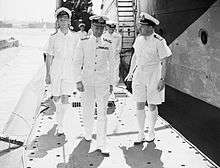Henry Pridham-Wippell
Admiral Sir Henry Daniel Pridham-Wippell, KCB, CVO (12 August 1885 – 2 April 1952) was a Royal Navy officer who served in the First and Second World Wars.
Sir Henry Daniel Pridham-Wippell | |
|---|---|
 Admiral Pridham-Wippell, centre, aboard HM Submarine Torbay in Alexandria Harbour, May 1942. Torbay's commander, Anthony Miers, is at right. | |
| Born | 12 August 1885 Bromley, Kent |
| Died | 2 April 1952 (aged 66) Kingsdown, Deal, Kent |
| Allegiance | United Kingdom |
| Service/ | Royal Navy |
| Years of service | 1900–1948 |
| Rank | Admiral |
| Commands held | Commander-in-Chief, Plymouth (1945–47) Commander-in-Chief, Dover (1942–45) 1st Battle Squadron (1941) Force B (1940–41) Home Fleet Destroyer Flotillas (1936–38) Operations Division (1933–35) 6th Destroyer Flotilla (1932–33) HMS Campbell (1932–33) HMS Enterprise (1928–30) |
| Battles/wars | First World War
Second World War |
| Awards | Knight Commander of the Order of the Bath Commander of the Royal Victorian Order Mentioned in Despatches Officer of the Order of the Nile (Egypt) War Cross (Greece) |
Early life
Educated at The Limes, Greenwich and at Royal Naval College, Dartmouth,[1] Henry Daniel Pridham-Wippell[1] joined the Royal Navy in 1900.[2] He served in the First World War in ships of the Grand Fleet.[2] He took charge of the destroyers at Gallipoli in 1915 and served on the Adriatic and Palestine coasts from 1916.[2]
Pridham-Wippell was made Captain of HMS Enterprise in 1928 and Commander of the 6th Destroyer Flotilla of the Home Fleet in 1932.[2] In 1932, he found in the middle of a crisis when he led a squadron of destroyers into the Free City of Danzig (modern Gdańsk, Poland) and was faced with the choice whatever to acknowledge or not the Polish destroyer ORP Wicher which had entered Danzig harbour without the permission of the Senate of Danzig.[3] After seeking the advice of the British consul in Danzig, Pridham-Wippell exchanged visits with Lieutenant Commander Tadeusz Morgenstern-Podjazd of the Wicher on 15 June 1932.[3] Pridham-Wippell went on to be Director of the Operations Division at the Admiralty in 1933 and Commander of the Home Fleet Destroyer Flotillas in 1936.[2] He went on to be Director of Personal Services at the Admiralty in 1938.[2]

Pridham-Wippell served in the Second World War as Commander of the 1st Battle Squadron in the Mediterranean from July 1940.[2] He was knighted for his part in the Battle of Cape Matapan in the Mediterranean in March 1941 and was a survivor of the sinking of the battleship HMS Barham in November 1941.[4] He went on to be Commander-in-Chief, Dover in 1942.[2]
After the war, Pridham-Wippell was appointed Commander-in-Chief, Plymouth.[2] He retired in 1948.[2]
References
- Houterman, Hans. "Royal Navy (RN) Officers 1939–1945". Retrieved 30 April 2010.
- Liddell Hart Centre for Military Archives
- Piaskowski 1984, p. 9-10.
- HMS Barham Association
Sources
- Piaskowski, Stanisław Kontrtorpedowce „Wicher” i „Burza”, Albany: Sigma Press, 1984.
External links
| Wikimedia Commons has media related to Henry Pridham-Wippell. |
| Military offices | ||
|---|---|---|
| Preceded by Robert Cunliffe |
Commander-in-Chief, Dover 1942–1945 |
Succeeded by Henry Bousfield |
| Preceded by Sir Ralph Leatham |
Commander-in-Chief, Plymouth 1945–1947 |
Succeeded by Sir Robert Burnett |